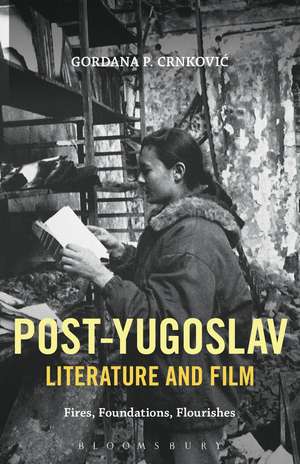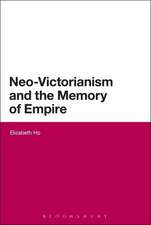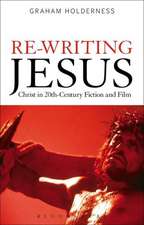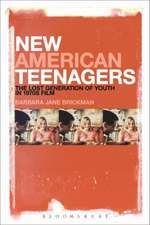Post-Yugoslav Literature and Film: Fires, Foundations, Flourishes
Autor Professor Gordana P. Crnkovicen Limba Engleză Paperback – 28 mai 2014
| Toate formatele și edițiile | Preț | Express |
|---|---|---|
| Paperback (1) | 218.91 lei 6-8 săpt. | |
| Bloomsbury Publishing – 28 mai 2014 | 218.91 lei 6-8 săpt. | |
| Hardback (1) | 831.83 lei 6-8 săpt. | |
| Bloomsbury Publishing – 4 apr 2012 | 831.83 lei 6-8 săpt. |
Preț: 218.91 lei
Preț vechi: 275.55 lei
-21% Nou
Puncte Express: 328
Preț estimativ în valută:
41.89€ • 45.49$ • 35.19£
41.89€ • 45.49$ • 35.19£
Carte tipărită la comandă
Livrare economică 22 aprilie-06 mai
Preluare comenzi: 021 569.72.76
Specificații
ISBN-13: 9781628926590
ISBN-10: 1628926597
Pagini: 312
Ilustrații: 20 illus
Dimensiuni: 140 x 216 x 25 mm
Greutate: 0.41 kg
Editura: Bloomsbury Publishing
Colecția Bloomsbury Academic
Locul publicării:New York, United States
ISBN-10: 1628926597
Pagini: 312
Ilustrații: 20 illus
Dimensiuni: 140 x 216 x 25 mm
Greutate: 0.41 kg
Editura: Bloomsbury Publishing
Colecția Bloomsbury Academic
Locul publicării:New York, United States
Caracteristici
Explores literary and cinematic works from Croatia, Bosnia and Herzegovina, Serbia, Slovenia, and Macedonia.
Notă biografică
Gordana P. Crnkovic is Professor of Slavic and of Comparative Literature, Cinema and Media at the University of Washington, Seattle, USA. Her writings include Imagined Dialogues: Eastern European Literature in Conversation with American and English Literature (2000), over thirty articles on literature and film, as well as texts from the experimental video Zagreb Everywhere.
Cuprins
AcknowledgmentsPronunciation GuideIntroductionPost-Yugoslav Literature and Film, and a Different Kind of Knowledge Chapter 1 Foundations IWhile Falling Asleep: A Trace of the Moment in Yugoslavia Chapter 2Play and the Language of Community Against Rumor and the Guns: Alenka Mirkovic's 91.6 MHz Chapter 3Reclaiming Charisma, Resetting the Senses: Vladimir Arsenijevic's In the Hold Chapter 4The Ethics of Listening and the Grounding of a Child: Milcho Manchevski's Before the Rain Chapter 5 Foundations IIEternal Realms and Individual Victims in Ivo Andric's Ex Ponto and Unrest Chapter 6"The Truthful Road to Me": Short Takes on Six Bosnian FilmsChapter 7Under the Star of Orwell: Jurica Pavicic's Plaster Sheep and Ante Tomic's Nothing Should Surprise Us Chapter 8The Museum Spills Out on the Square, the Past's Challenge to the Present: The Films of Vinko Bresan Chapter 9I am You and You are Me: on Liberating Anti-Nationalism Chapter 10Pleasant Distractions: The Danger of Close-ups and Maja Weiss's The Border Guard Chapter 11 Foundations IIISuccess vs. Logic: Miroslav Krleza's On the Edge of ReasonChapter 12Anarchists Today: The Lazarus Project by Aleksandar Hemon Bibliography Index
Recenzii
"This superb book provides a complex and engaging introduction to the culture of post-Yugoslavia, offering a philosophical reflection on the literature and film of the contemporary Balkans and the scars left behind by socialism, war and genocide. Through nuanced readings of key works, Crnkovic also makes a strong case for the emancipatory character of works of art, their enduring ability to articulate a civilizational rebuke to the human capacity for violence. The volume is a major contribution to our understanding of southeastern Europe and, more broadly, to the debates over the politics of aesthetics today." -- Russell A. Berman, Walter A. Haas Professor in the Humanities and Professor of Comparative Literature and German Studies, Stanford University, USA
"With the publication of Post-Yugoslav Literature and Film, Gordana Crnkovic has confirmed her standing as one of the leading specialists in post-Yugoslav culture. Anyone interested in the literature and film of Bosnia-Herzegovina, Croatia, Macedonia, or Serbia will find much of interest in this volume. This is a work of mature scholarship, rich in insights, and deserves a place in every university library." -- Sabrina Ramet, Professor of Political Science, Norwegian University of Science and Technology, Norway
"Gordana Crnkovic's Post-Yugoslav Literature and Film is a groundbreaking book which single-handedly creates a new research agenda. Her analyses of Macedonian, Serbian, Croatian and Slovene literature and films will be much admired by readers and influence the way we think about post-Yugoslav cultural space in decades to come." -- Zoran Milutinovic, Senior Lecturer in South Slav Literature and Culture, School of Slavonic and Eastern European Studies, University College London, UK
At first sight, Crnkovic's book could leave the impression of being merely an informative overview of select films and books from post-Yugoslav cultural production. However, this is actually an argument-driven book, very carefully composed, with a hidden plot and topics selected in such a manner that the films and books Crnkovic discusses act as steps in the development of the argument. . Post-Yugoslav Literature and Film: Fires, Foundations, Flourishes is an excellent book that redirects scholarly interest in ex-Yugoslav cultures towards a new territory-not only towards a new production, but also towards a new agenda in approaching it.
"With the publication of Post-Yugoslav Literature and Film, Gordana Crnkovic has confirmed her standing as one of the leading specialists in post-Yugoslav culture. Anyone interested in the literature and film of Bosnia-Herzegovina, Croatia, Macedonia, or Serbia will find much of interest in this volume. This is a work of mature scholarship, rich in insights, and deserves a place in every university library." -- Sabrina Ramet, Professor of Political Science, Norwegian University of Science and Technology, Norway
"Gordana Crnkovic's Post-Yugoslav Literature and Film is a groundbreaking book which single-handedly creates a new research agenda. Her analyses of Macedonian, Serbian, Croatian and Slovene literature and films will be much admired by readers and influence the way we think about post-Yugoslav cultural space in decades to come." -- Zoran Milutinovic, Senior Lecturer in South Slav Literature and Culture, School of Slavonic and Eastern European Studies, University College London, UK
At first sight, Crnkovic's book could leave the impression of being merely an informative overview of select films and books from post-Yugoslav cultural production. However, this is actually an argument-driven book, very carefully composed, with a hidden plot and topics selected in such a manner that the films and books Crnkovic discusses act as steps in the development of the argument. . Post-Yugoslav Literature and Film: Fires, Foundations, Flourishes is an excellent book that redirects scholarly interest in ex-Yugoslav cultures towards a new territory-not only towards a new production, but also towards a new agenda in approaching it.











